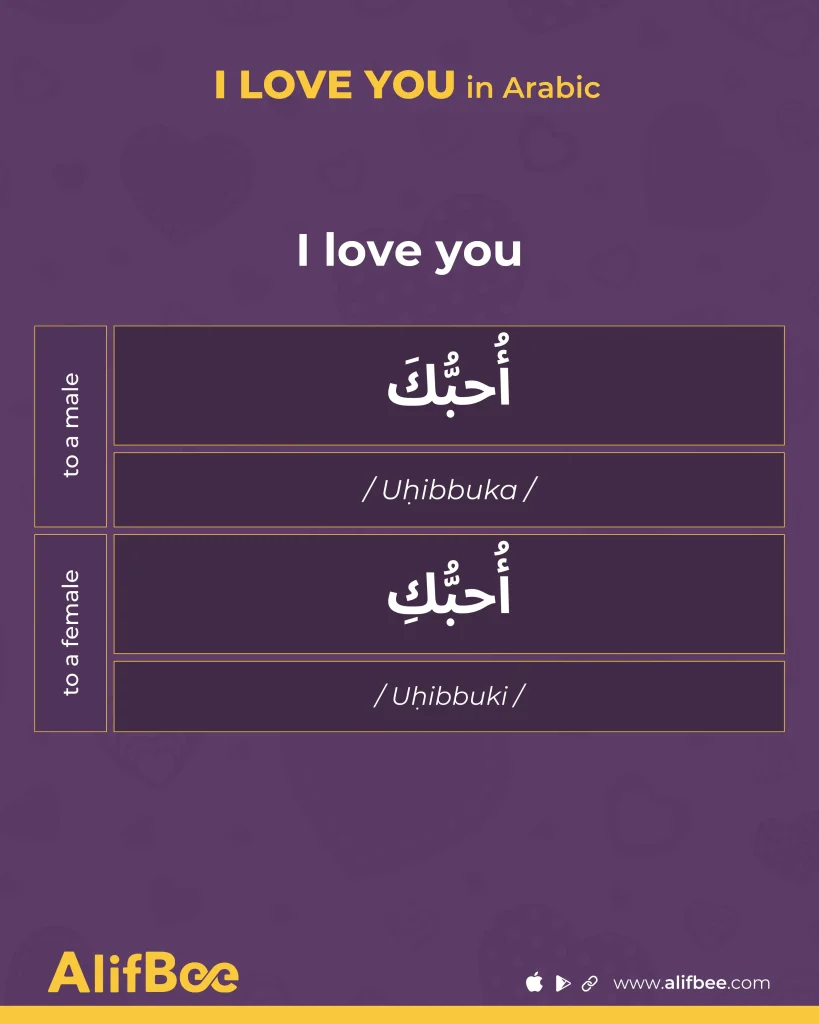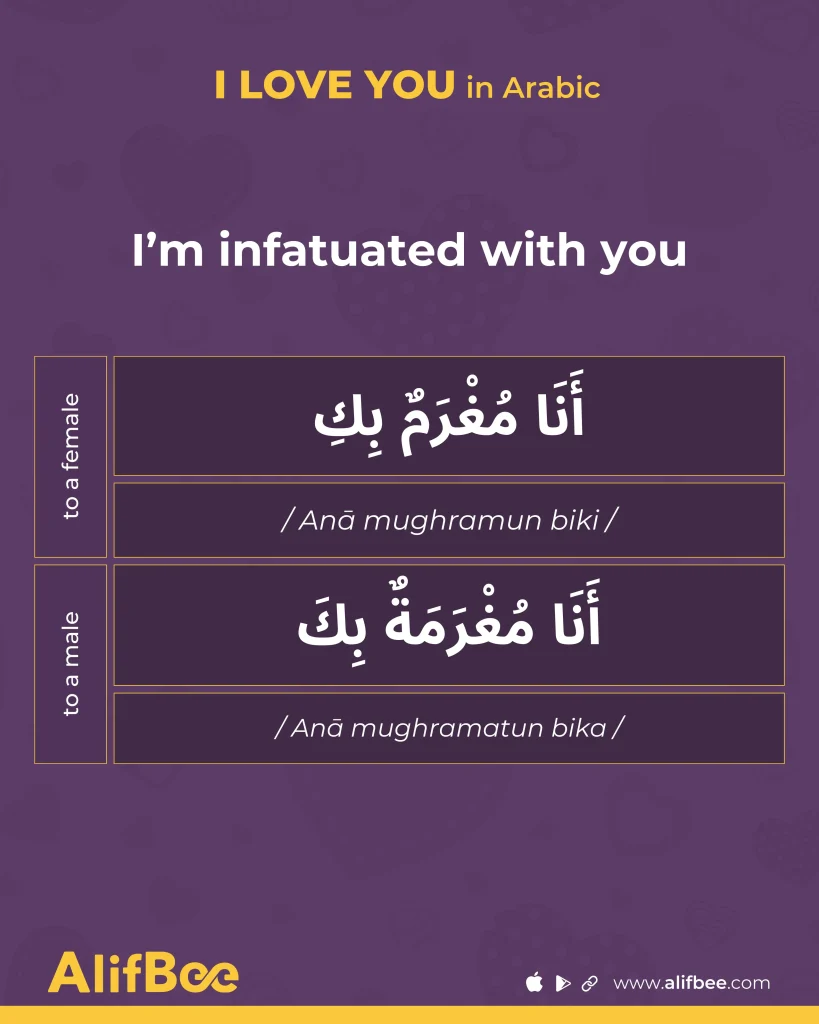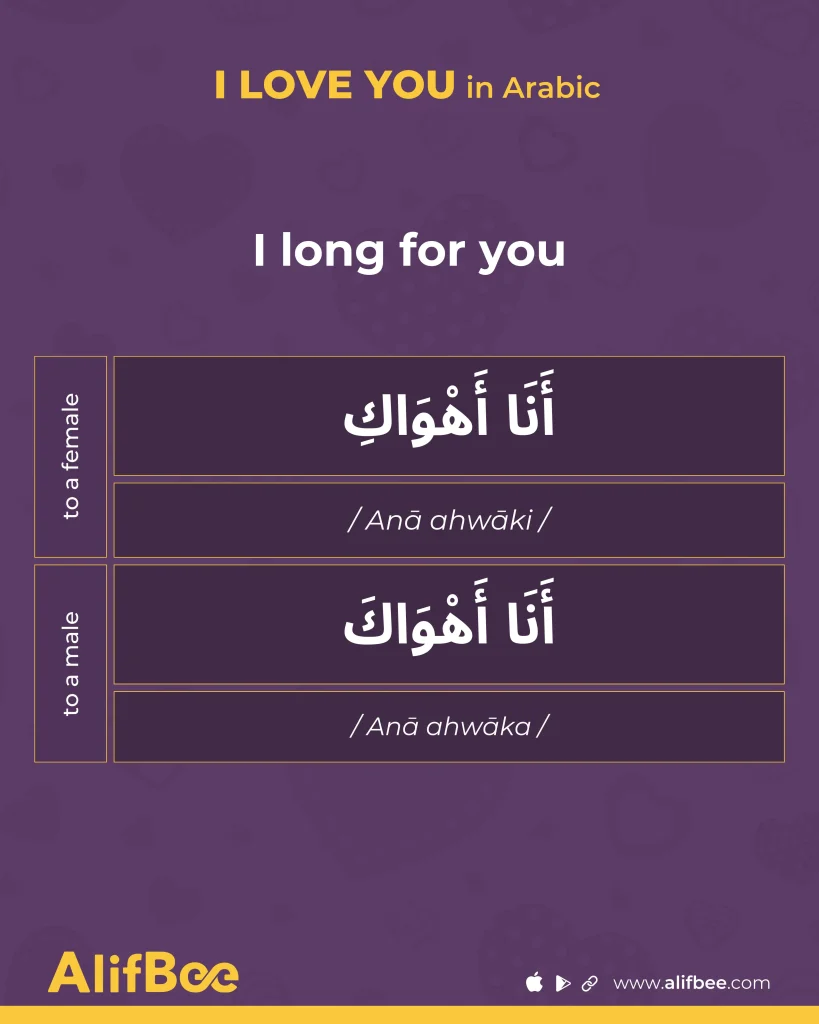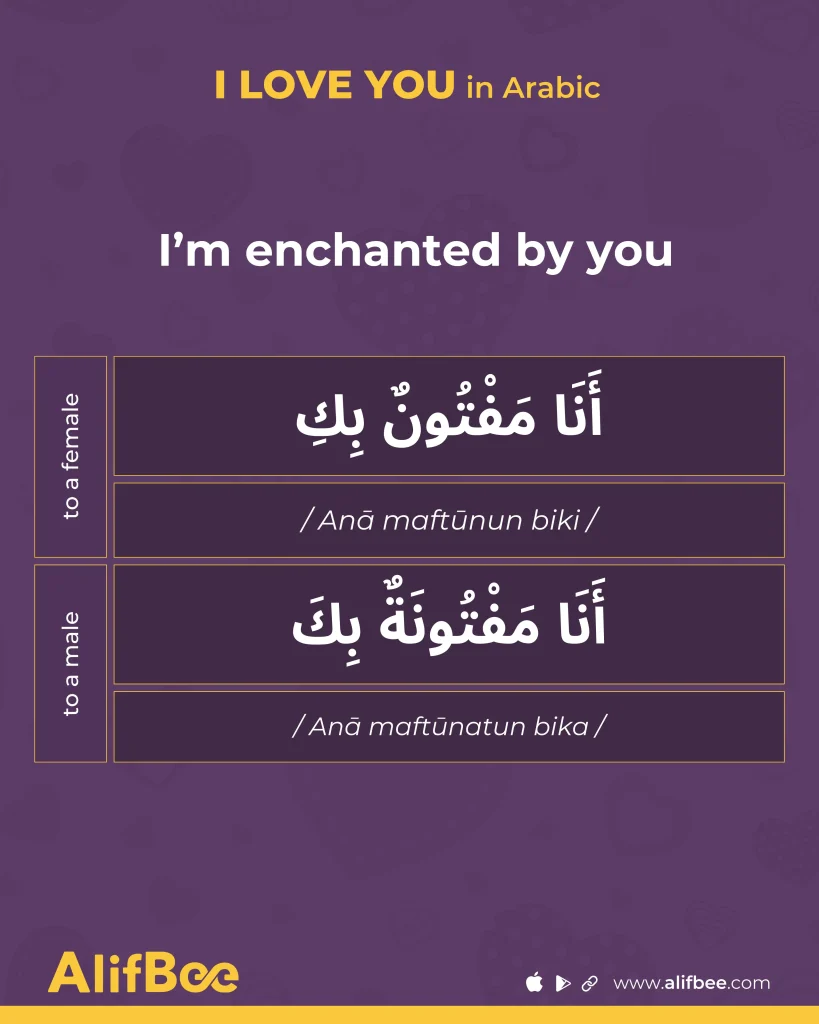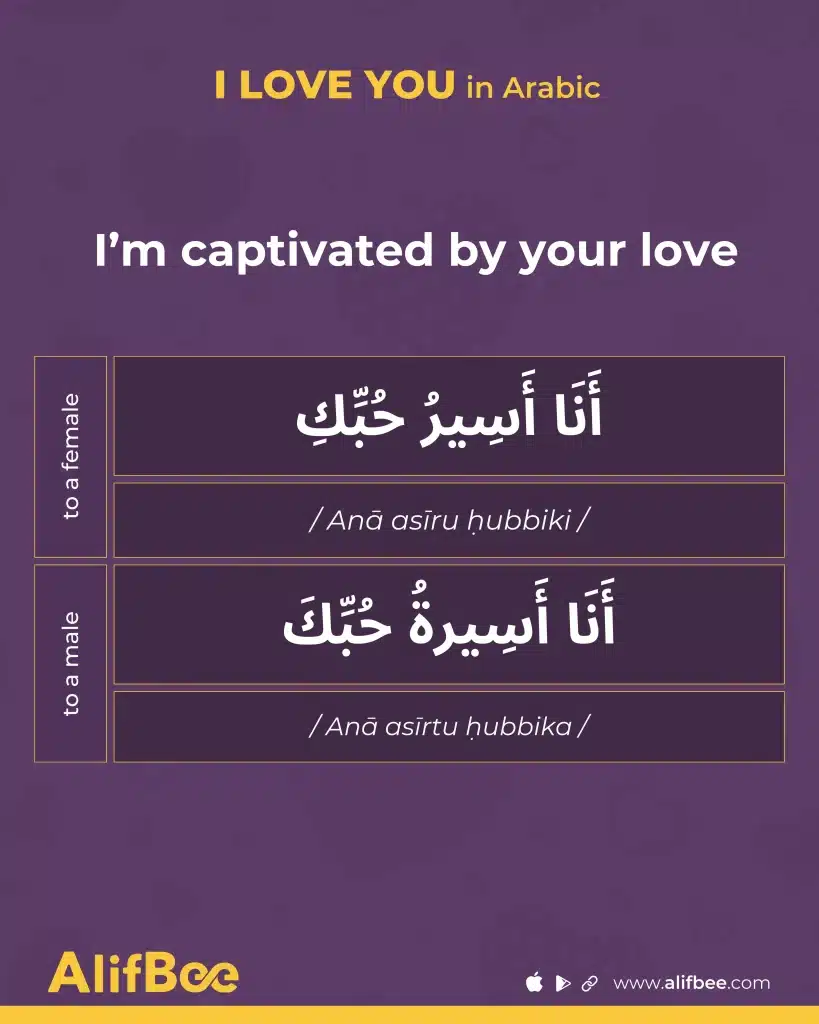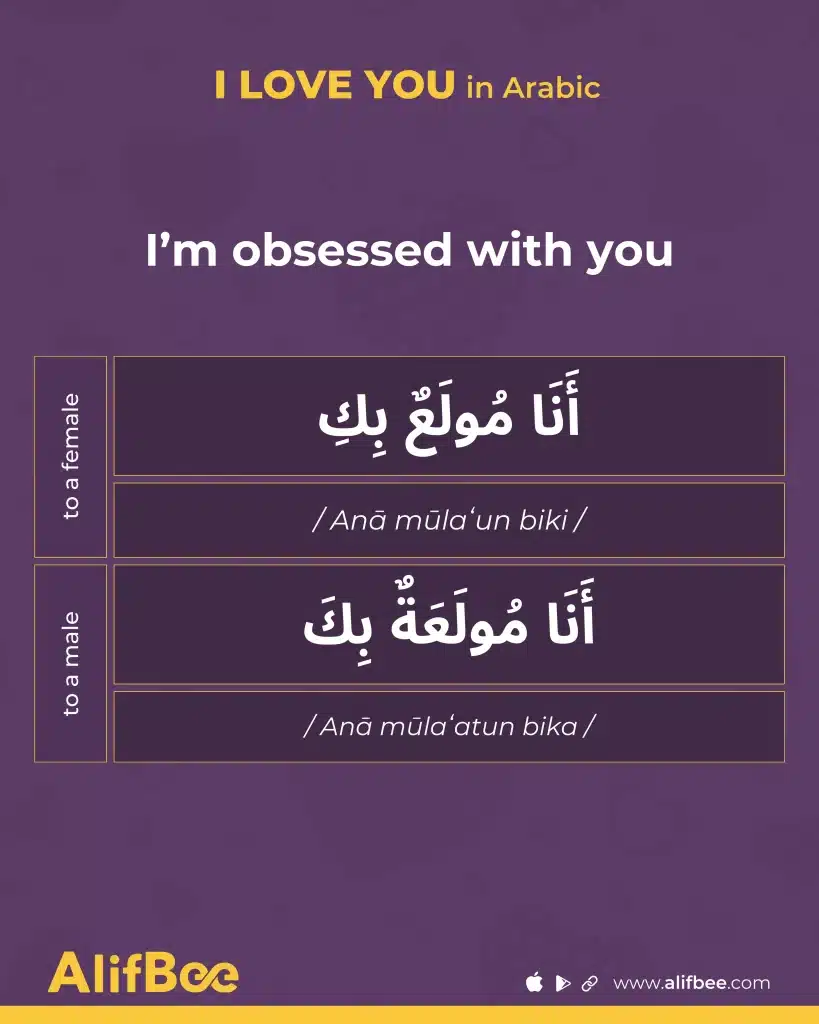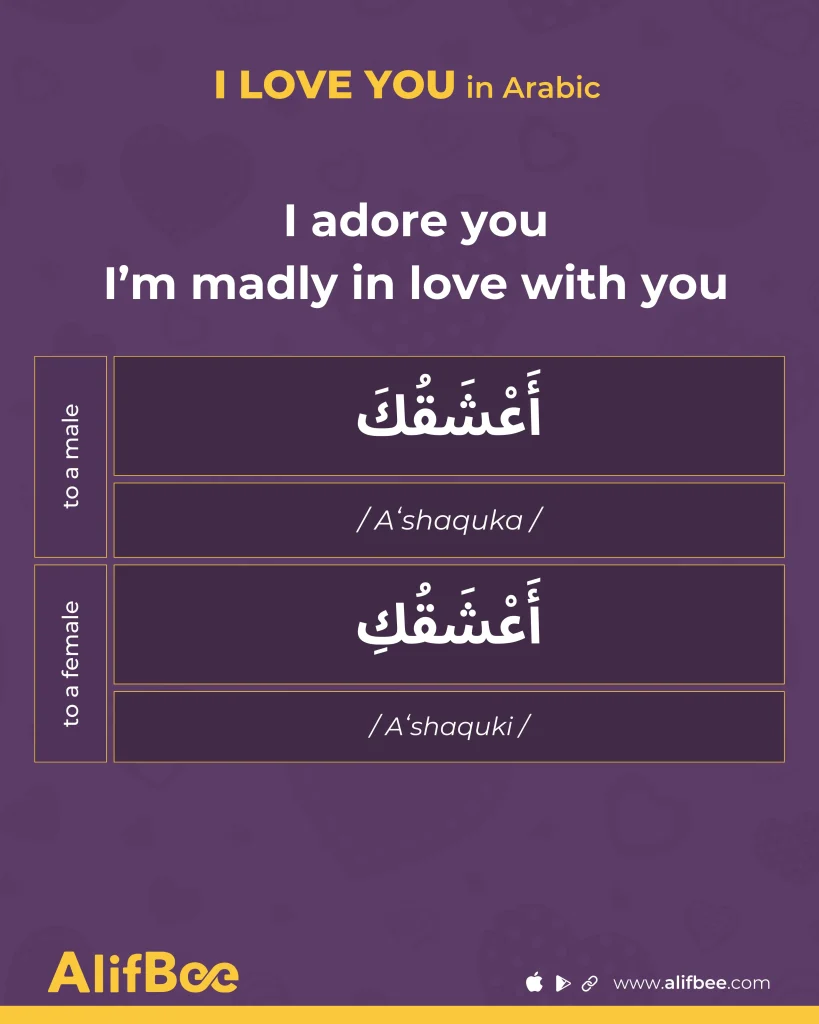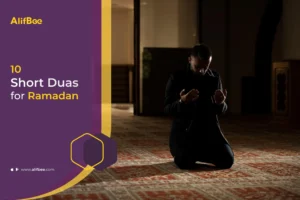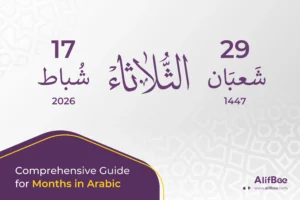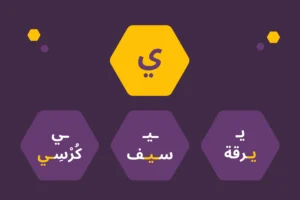When people are interested in learning a language, they usually learn a few basic phrases by heart in the beginning, like saying Hello, Goodbye, I miss you, Thank you, and many more.
Actually, many people know how to say these phrases in popular languages, let alone the language they want to learn.
Since love is one of the most universal and beautiful feelings in the world, we are going to learn how to say I Love You in Arabic through a wide array of romantic Arabic phrases that reflect the beauty and depth of the Arabic language.
We’ll also point out the differences between Arabic love phrases in Modern Standard Arabic (MSA) and in other common Arabic dialects, mainly the Levantine and Egyptian Arabic.
Your Arabic Takeaway
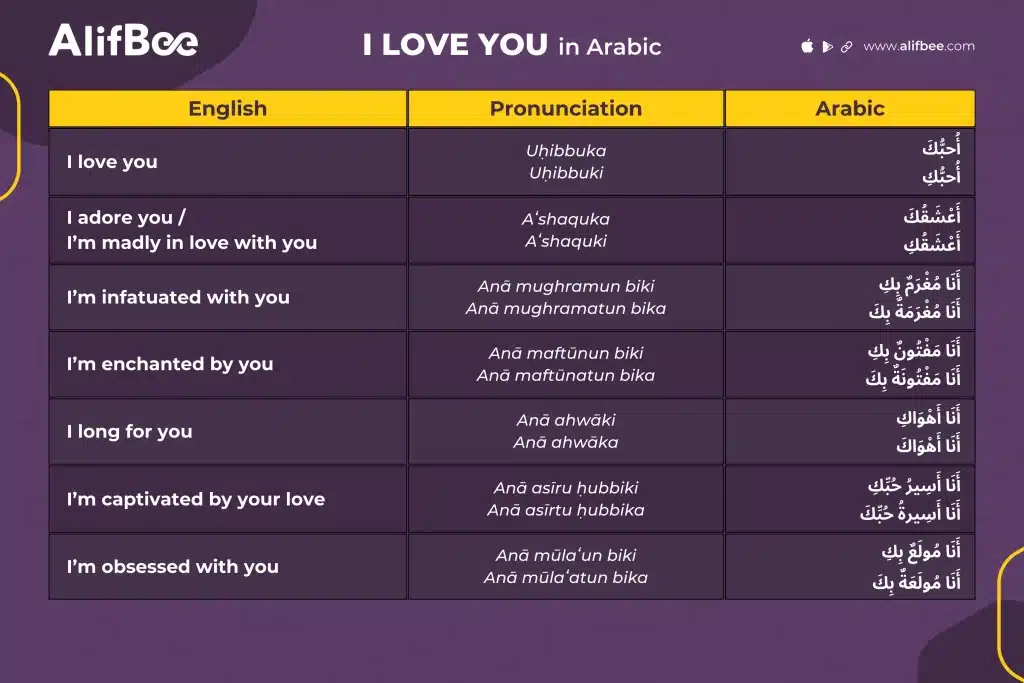
How to Say I Love You in Arabic in MSA
أُحبُّكَ
English
Transliteration
Arabic
I love you (to a male)
uḥibbuka
أُحبُّكَ
to a female
uḥibbuki
أُحبُّكِ
You must have heard this one before because it is one of the most common phrases used to express love in Arabic.
It can be used in romantic relationships, but also for family, friends, or even things, like saying, Uḥibu alshwkwlā, أُحبُ الشوكولا (I love chocolate)
أَعْشَقُكَ
English
Transliteration
Arabic
I adore you
I’m madly in love with you
(to a male)
aʻshaquka
أَعْشَقُكَ
to a female
aʻshaquki
أَعْشَقُكِ
This phrase is stronger and more intense than أحبك. It is usually used in romantic contexts between lovers.
It expresses deep passionate love. However, you can use it to express deep love for things, ideas, concepts and places like saying Aʻshaqu balady أعشقُ بَلَدي (I adore my country).
أَنَا مُغْرَمٌ بِكِ
English
Transliteration
Arabic
I’m infatuated with you (to a male)
anā mughramatun bika
أَنَا مُغْرَمَةٌ بِكَ
to a female
anā mughramun biki
أَنَا مُغْرَمٌ بِكِ
This phrase shows strong attraction, often with passion and obsession. It is mostly found in Arabic poetry, romantic novels, or formal speech. You might also hear this in the Lebanese dialect, but with a slight change in how it’s written and pronounced, for example:
– Anā maghrūmih fīk – أنَا مَغْرُومِة فيك (I’m infatuated with you)
– Anā maghrūmih bhāllwn أَنَا مَغْرُومِة بهاللون – (I’m infatuated with this color)
Speakers of Lebanese Arabic use it to express love for their loved ones, or even things, like a color, dress or a favorite place.
أَنَا مَفْتُونٌ بِكِ
English
Transliteration
Arabic
I’m enchanted by you (to a male)
anā maftūnatun bika
أَنَا مَفْتُونَةٌ بِكَ
to a female
anā maftūnun biki
أَنَا مَفْتُونٌ بِكِ
This phrase expresses great admiration of someone to the extent of being enchanted by them, as if someone’s charm or beauty has a spell on you. It is used in literature, poetry, or when speaking very romantically.
أَنَا أَهْوَاكِ
English
Transliteration
Arabic
I long for you (to a male)
anā ahwāka
أَنَا أَهْوَاكَ
to a female
anā ahwāki
أَنَا أَهْوَاكِ
This is a classical, poetic way to express love in Arabic. It is very common in Arabic love songs and poetry.
You might hear it, but quite rarely in daily conversation, and people know it because of music.
أَنَا أَسِيرُ حُبُّكِ
English
Transliteration
Arabic
I’m captivated by your love (to a male)
anā asīrtu ḥubbika
أَنَا أَسِيرةُ حُبِّكَ
to a female
anā asīru ḥubbuki
أَنَا أَسِيرُ حُبُّكِ
This phrase means literally, I’m a prisoner of your love, a very poetic, dramatic way of saying you’re completely taken over by someone’s love. Also, you won’t hear it often in daily conversations.
أَنَا مُولَعٌ بِكِ
English
Transliteration
Arabic
I’m obsessed with you (to a male)
anā mūlaʻatun bika
أَنَا مُولَعَةٌ بِكَ
to a female
anā mūlaʻun biki
أَنَا مُولَعٌ بِكِ
This one shows intense, burning affection. It is rarely used in casual conversation, but strong in poetry.
How to Say I Love You in Arabic Dialects
Learning how to say I Love You in Arabic dialects will feel more practical since you will be more likely to use it in real life.
I will give you a small tip to make it easy for you to switch from formal to some of the causal phrases we have already covered.
We usually add the letter /Bāʼ/ ب at the beginning of some words to change them from formal standard Arabic to everyday spoken Arabic.
For example, the first word we learned together is Uhibbuk أحبك. Just add /b/ ب instead of /U/ أُ so it becomes Bhibbak بحبك for a male and Bhibbik for a female.
Notice that the pronunciation differs slightly, because we change tashkeel (Short vowels or diacritical marks written as symbols above or below Arabic letters.)
The pronunciation can also differ between dialects. For example, in Levantine Arabic the B sound added to the start of the verb is silent, but in Egyptian Arabic it has a short a vowel.
So, بحبك is pronounced Bhibbak in Levantine Arabic and Bahibbak in Egyptian Arabic.
Examples of I Love You in Arabic Dialects
Let’s look at other examples (all in Levantine Arabic):
English
Transliteration
Arabic
I love you (M)
Bhibak
بحبَك
I love you (F)
Bḥbik
بحبِك
I adore you (M)
Bʻshaʼak
بعشقَك
I adore you (F)
Bʻshaʼik
بعشقِك
I long for you (M)
Bhwāk
بهواك
I long for you (F)
Bhwāki
بهواكِ
We also have another common Arabic expression in dialectical Arabic that means literally “I die for you”:
English
Transliteration
Arabic
I’m crazy about you (F)
bmūt fīki
بمُوْتْ فِيكِ
I’m crazy about you (M)
bmūt fīk
بمُوْتْ فِيكِ
I’m crazy about you (F) Egyptian
bamūt fīki
بمُوْتْ فِيكِ
Final word
There are countless ways to express feelings of love and say I Love You in Arabic, which is not a surprise for the language known for its poetic richness.
Some of the expressions you learned today fit in everyday conversations, while others are perfect for poetic and even formal settings.
You can share these Arabic expressions with your loved ones, family, and friends. They can be used everyday or in special occasions, in writing or in everyday conversations.
The more you practice, the more natural they will feel. And who knows? You might just make someone’s day brighter by saying the three precious words I Love You in Arabic.
If you enjoyed this topic, you will love 25 Arabic Love Words and Expressions For A Special Day, which will give you more words and phrases for special occasions.
You can also download the AlifBee app, which can support your Arabic learning journey with engaging exercises and lessons.

